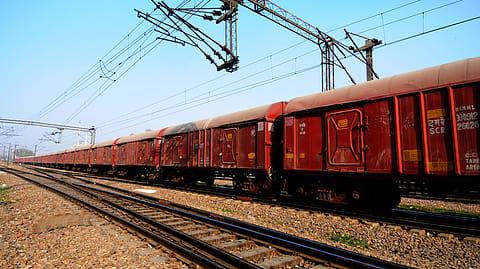Indian Railways lines up ₹30,000 crore mega wagon procurement plan
The railway ministry is expected to soon float tenders for the procurement of the freight wagons.

In a move that will give a huge fillip to domestic wagon manufacturing industry, the union ministry of railways is planning to procure one lakh wagons in the next three years at an investment of close to ₹30,000 crore. Sources close to the development have pointed out that the ministry will soon float tenders for the procurement of the freight wagons.
A source pointed out that railway minister Ashwini Vaishnaw held a marathon deliberation with the domestic rolling stock industry on February 5. "The minister conveyed the railways' requirement and also took feedback from the industry," the source pointed out.
Another source said that the railways' plans to enhance its freight capacity from the current levels. "The railways plans to enhance its freight loading from slightly less than 4 million tonne per day currently to over 5 million tonne per day. Seen in the context of the target, the ministry will need to procure about one lakh wagons in the next three years," the source said, adding that this will entail an investment of about ₹30,0000 crore.
This is an ambitious plan given the current levels of wagon procurement by the ministry of railways. As of now, the average wagon procurement per annum by the ministry is of 13,000 units at a cost of about ₹4,000 crore. "Bulk tender will provide cost advantage to the government and better visibility to the industry," said the second source.
The industry, meanwhile, expects a major boost to its order book in the next couple of years. Ashish Gupta, managing director, Texmaco Rail and Engineering, told Fortune India, "Rolling stock procurement plan of the government is looking robust. We will have our hands full as far as the wagon manufacturing is concerned for the next three to four years. Directionally these plans are very positive."
Gupta also points out that with the dedicated freight corridor coming up, the demand for the container rakes has gone up from the private container operators. This too comes as a major fillip for the wagon manufacturing industry. The railway ministry on its part has initiated tenders for 8,875 wagons of both high and low axle load at ₹2,500 crore.
A point to be noted here is that wagon procurement is focussed on the traditional goods as of now as the orders pertain to the general purpose wagons, which the government has been using for traditional commodities like coal, iron ore and food grains. This essentially means that the railway ministry foresees that while the freight loading may go up in the coming years, the freight mix is largely going to remain the same, with no additional commodity being tapped for revenue generation.
Recommended Stories
In the budget for FY23, the railway ministry has targeted freight revenue of ₹1,65,000 crore up from ₹1,37,810 crore in FY22. It may, however, be noted that the traffic receipts for the current financial year has been revised upwards to ₹145,275 crore. Even though the budgetary provisions for the wagon procurement for FY23 at ₹7,978 crore look muted in comparison with the latest push, the ministry officials say that the estimates will change as the plan fructifies during the course of the year. It may be noted that the FY22 rolling stock spend has been increased to ₹11,181 crore in the revised estimates against ₹6,815 crore in the budget estimate for the year.